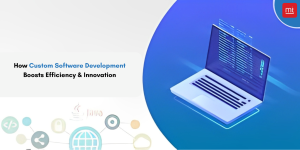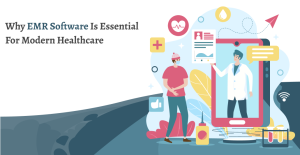The Cost of Cyberattacks: Why Investing in Antivirus Software is Essential for Businesses

Business cybersecurity policy is more significant than ever as the growing threat of cyber incidents becomes more common for businesses.
Implementing antivirus software for businesses is crucial to safeguarding them from malicious attacks such as ransomware, viruses, trojans, and more. Ensuring their business operations run smoothly and securely in today’s digital landscape.
In this blog, we will examine the importance of antivirus software for businesses and some features you should consider before choosing it.
Why is Antivirus Software Important for Businesses?
Let’s explore the several reasons why this investment is essential to the success and sustainability of your organization.
Safeguarding crucial data
Viruses, worms, trojans, spyware, and ransomware are all part of what is known as malware. These harmful apps may wreak havoc on your company by stealing confidential information, altering files, and making computers useless.
Antivirus software is specifically designed to identify, isolate, and eradicate these dangers before they can harm. Investing in a well-regarded antivirus solution guarantees safeguarding your organization from the ever-changing array of viruses.
Protect mobile devices
Businesses are increasingly using mobile devices for work, which has made these gadgets a target for hackers. Sensitive information is often stored on mobile devices, which are also open to malware and other online risks.
Mobile-specific antivirus software may effectively safeguard against these risks, guaranteeing your company data’s continuing security even when viewed via mobile devices. It has particular significance for businesses that use remote or mobile employees.
Backups
Many antivirus products provide this function, but not all. The advantages of backups are apparent: any firm that has suffered a cyberattack or significant data loss would be in a far better position if it could resort to backups without hesitation.
With this essential feature in solid antivirus software, you will have peace of mind knowing that your data will be instantly restored if anything goes wrong. Given the value of this capability, it is wise to ensure that any antivirus product you are considering has it.
Business Continuity
Cyber attacks may significantly disrupt business activities, resulting in substantial downtime and loss of productivity. For example, ransomware attacks can restrict system access until a ransom is paid. Disruptions of this kind impact your financial performance and undermine consumer confidence.
Antivirus software is essential for maintaining business continuity. It detects and mitigates threats before they can disrupt operations. With adequate antivirus protection, your business can continue to operate efficiently in the presence of cyber threats.
Protect reputation
Reputation is paramount in the digital era. If customers learn about a data breach, they may lose faith in the business and its products or services. Businesses are expected to safeguard their customers’ confidential information, and any neglect may result in a decline in credibility.
Antivirus software safeguards your reputation by thwarting data breaches and guaranteeing the security of your client’s information. By allocating resources towards implementing robust security protocols, you provide evidence to your clientele that you prioritize their privacy and security.
Cost-Effective Security
Many businesses, particularly those classified as small and medium-sized organizations (SMEs), may believe that purchasing antivirus software is superfluous. It’s crucial to remember that protecting against a cyberattack is significantly more expensive than using antivirus software.
Data breaches may cause substantial financial losses in addition to possible penalties, legal expenses, and repair costs. Purchasing antivirus software is a long-term investment that provides proactive security measures that may help your business save money.
Enhancing Employee Productivity
Malicious software infiltrates computer systems, leading to significant delays while IT personnel strive to address the problem. This lack of activity impedes employee productivity and further affects corporate operations.
Antivirus software assists in preserving productivity by preventing infections and minimizing disruptions. Your employees will be able to concentrate on their responsibilities and contribute to the expansion of the business without the constant threat of malware, as they are protected by efficient antivirus software.
Real-Time Threat Detection
Thanks to cutting-edge technology like AI and ML, antivirus programs nowadays can identify and respond to threats in real-time. As a result, the danger of infection may be reduced due to the rapid detection and elimination of new and developing risks.
The importance of real-time threat detection cannot be overstated in the current dynamic digital landscape characterized by the relentless evolution of cyber threats.
By allocating resources to purchase antivirus software with real-time capabilities, you guarantee continuous protection of your organization against the most current dangers.
Peace of Mind
Buying antivirus software gives you a sense of security. When you know your company is safe from cyber-attacks, you can emphasize where it belongs—in operating and developing your business. Your digital infrastructure and sensitive data are safe since you have taken preventative measures. This assurance is priceless in the modern digital world, where cyber risks are ever-present.
Features to Look for in Antivirus Software
Before buying antivirus software, businesses should make sure it includes these features:
Easy to manage
Poorly designed user interfaces compound the danger of human error, leading to increased error rates and even computer security breaches. They may even discourage people from using the antivirus program completely.
An optimal antivirus solution should include a well-structured design that allows users to carry out their daily job activities without reducing effectiveness.
Different types of threat protection
Antivirus software should provide signature-based detection capabilities by its fundamental nature. Business enterprises focused on sophisticated threats should choose antivirus software incorporating heuristics, artificial intelligence, and behavior tracking.
Automatic Updates
The most dependable and effortless method of remaining informed about the most recent hazards is through automatic updates. If users have to install updates manually, important new protections might be overlooked, leading to an increased risk of exposing the system to infection.
Real-time scanning
The top antivirus programs circumvent this issue by using dynamic scanning technologies. These technologies routinely and automatically search your computer for indications of harmful entities. This function is a lifesaver in preventing harmful software from infiltrating your computer and wreaking havoc.
Phishing Protection
Cybercriminals’ phishing techniques have evolved, so your antivirus software must have strong protection against these attacks. Advanced phishing prevention capabilities, for example, may detect and prevent phishing schemes by analyzing website URLs, content, and user behavior.
Using them, you better protect yourself against phishing efforts, fraudulent websites, and harmful links seeking to steal your personal information.
Implementing Firewall
Firewalls monitor and filter incoming and outgoing data, adding a layer of security to a network. Their primary function is protecting against potentially harmful external traffic.
Many antivirus packages integrate a firewall, but rather than assuming that your selected provider has one, you should confirm. Your antivirus software may lack a specific firewall capability, similar to a VPN service.
Reviewing your plan to determine if a firewall is included is advisable. It could be an always-on feature that cannot be turned off.
Final Thoughts
Investing in the best antivirus software is essential for your company’s security and prosperity. It provides defense against a broad spectrum of cyber threats, preserves confidential information, guarantees uninterrupted business operations, and aids in adhering to regulatory requirements.
Furthermore, it increases employee productivity, safeguards mobile devices, and develops consumer trust. The expense of responding to a cyberattack is significantly greater than investing in antivirus protection, rendering it a prudent and essential investment for businesses of all sizes.






